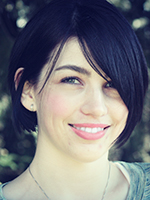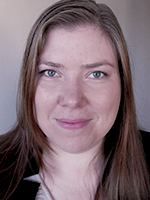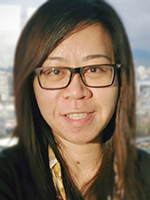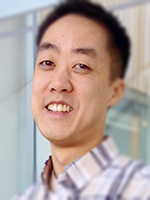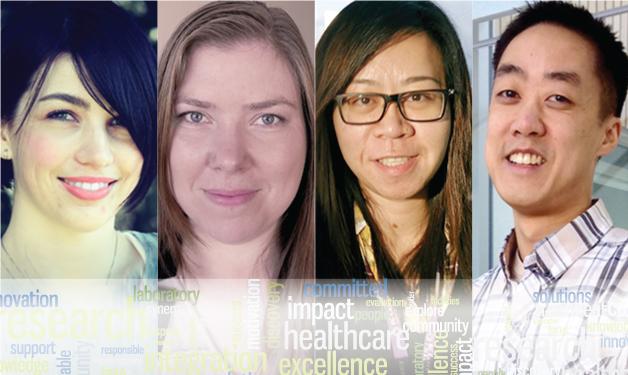
Awardees remind students that with hard work in health sciences research comes the possibility of saving lives.
Another school year is almost finished and many soon-to-be high school graduates are more seriously considering the question they’ve been asked all their lives: “What do you want to be when you grow up?”
Four Vancouver Coastal Health Research Institute scientists with the Vancouver Prostate Centre (VPC) answered “health researcher” to that question during their own high school and university days and years later are being recognized for their successful health science and research work. Congratulations to VPC scientists Miriam Butler, Kirsi Ketola, Iris Luk and Kevin Tam, who recently received prestigious Prostate Cancer Canada fellowships that will further fund their areas of research.
With different experiences and influences that guided them into health sciences and research careers, the awardees have useful advice for young adults who may also be interested in changing the world, one cell at a time.
Miriam’s research concerns genetic changes that increase the number of proteins that regulate prostate cancer spread, resulting in unnatural activity in these cells. Miriam’s studies look to identify how these proteins work and develop compounds that inhibit this process, which could open the door to new and complementary prostate cancer therapies.
Q: How did you know you were going to be a researcher?
A: The first time I considered research as a career was as an undergraduate during a summer internship at a prostate cancer research lab. I was surrounded by a group of scientists who were eager to give advice and suggestions to improve experimental outcomes. It was a very collaborative atmosphere and a great representation of how all research is or should be.
Q: What are you hoping to achieve through your work?
A: In the short term, my goal is to continue working on the development of new therapeutics for prostate cancer.
Q: What do you like most about being a scientist?
A: I enjoy performing experiments that have the potential to lead to new discoveries that could one day benefit patients.
Kirsi’s work looks at how tumour cells respond to drug therapy and how they become resistant to such therapy. She and her colleagues have recently found a mechanism that causes resistance to the drug Enzalutamide, which stops androgen signalling. She hopes to develop new ways to prevent this drug resistance, which could lead to more successful treatment approaches for men with advanced prostate cancer.
Q: How did you know you were going to be a researcher?
A: I have been told that as a child I never stopped asking “Why?” and “How?” My favourite bedtime story was Marie Curie’s biography; I was so fascinated by radioactivity and how it affected DNA. Later, I became interested in cancer after a close family member passed away due to cancer – it made me want to find a cure. Also, when I was studying enzyme function in both chemistry and biology classes in grade school, I was sure I was the first person thinking of combining these two, inventing the field of biochemistry. Obviously, that wasn’t quite the case but I soon became more fascinated by genes and DNA and knew I would eventually become a researcher.
Q: What do you like most about being a scientist?
A: A scientist’s work really can make a difference – all of the medicines we take were created by scientists! For me, laboratory work is like playing – with gels, blots and liquids as well as culturing and staining living cells with different colors. And being a scientist gives you the opportunity to travel around the world, meet other scientists, work with them, and share ideas and thoughts. Personally, I also have passion for numbers and writing and as a scientist you get a chance to calculate and write a lot.
Iris' project explores the role of the BIRC6 protein, which has been identified as an inhibitor of cancer cell death in prostate cancer that has become resistant to treatment. By counteracting this protein with an agent they have developed, tumour cells will again become susceptible to death by traditional treatments.
Q: How did you know you were going to be a researcher?
A: I had a strong interest in science (biology) when I was in high school but I decided to get into research a year after graduating from my undergraduate studies. At that time I was working in a small private laboratory doing diagnostic test for patients. I realized that the routine lab work did not satisfy me. I wanted something else as my career and I kept thinking that I wanted to find a cure for cancer.
Q: What advice (or words of encouragement) do you have for recent high school graduates who may be interested in a career in the sciences?
A: I remember advice from an academic and industry scientist: “The most important thing is to find out what you are really interested in.” It is actually harder to know what you want, than to achieve what you want. When you realize what your desire is, you will be able to achieve it even though there will be a lot of challenges. Your passion will drive you through the difficulties. An exercise that may help is to imagine yourself in your 'dream career' (e.g. in a research lab). Go deeper into the details of that imagined scenario, like the environment, people, all the machines, etc. Do this regularly and it will become clearer exactly what you want.
Kevin is studying how the upregulation of a protein called SEMA3C in prostate cancer cells promotes tumour cell growth and metastasis. Determining how and why SEMA3C signalling becomes out of control in prostate cancer will help innovate novel therapies to combat the disease.
Q: How did you know you were going to be a researcher?
A: I became interested in research during my undergraduate studies. At that time I had many great mentors who offered guidance and made research fun and interesting. I think I gravitated toward cellular biology because these courses made sense to me and I often didn't understand what was going on in my other ones.
Q: What are you hoping to achieve through your work?
A: I am determined to make contributions to human health through my research. Harnessing the power of molecular biology to help people is my goal.
Q: What advice (or words of encouragement) do you have for recent high school graduates who may be interested in a career in the sciences?
A: Science, and research in particular, is an extremely challenging field but is also a very rewarding one. Research requires determination and extraordinary patience. However, working at the precipice of new discovery is really neat. It is an exciting time to be part of scientific research. Rapidly advancing technology and bold new research endeavours are giving us unprecedented discovery potential. The potential applications to human health are enormous.
